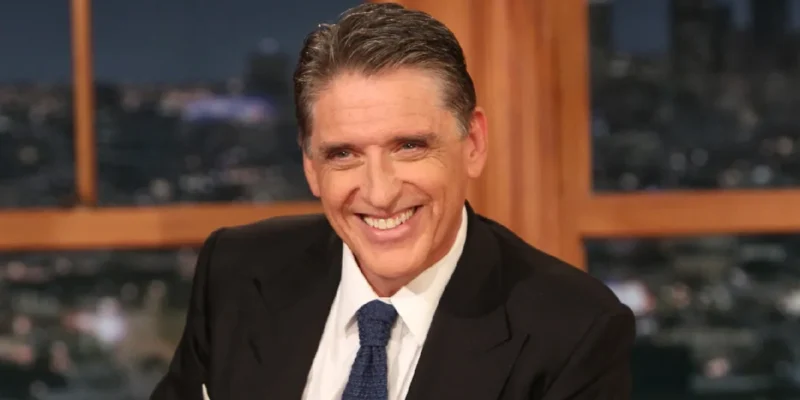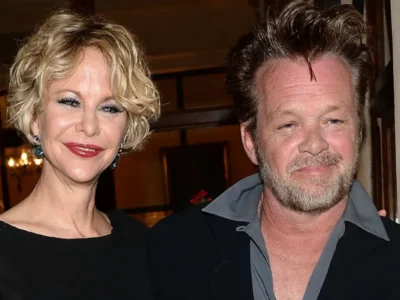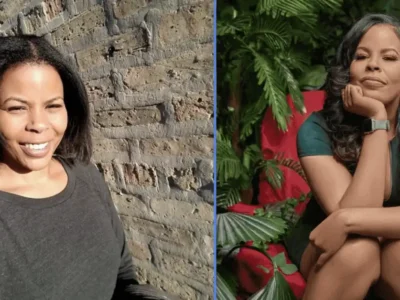
Craig Ferguson stands as one of the most authentic late-night hosts in television history. The Scottish comedian brought a fresh approach to American late-night TV during his time on The Late Late Show. His unique mix of improvisation, storytelling, and genuine conversation made him stand out among his peers.
Ferguson’s journey from punk drummer to beloved talk show presenter shows his versatility as an entertainer and his ability to connect with audiences across different formats.
Early Life and Career Beginnings
Craig Ferguson was born on May 17, 1962, in Glasgow, Scotland. His early years in Glasgow shaped his outlook and humor, giving him the distinctive Scottish wit that would later charm American audiences. Growing up in a working-class environment, Ferguson developed a sharp sense of humor and storytelling ability. These skills would serve him well throughout his entertainment career.
Before finding fame in comedy, Ferguson played drums in punk bands during the early 1980s. His most notable band was the Dreamboys, which included future Doctor Who star Peter Capaldi. This musical background gave Ferguson a stage presence and timing that would prove valuable in his later comedy career. His transition from musician to comedian began when he created the character “Bing Hitler,” a satirical folk singer who gained popularity at the Edinburgh Festival.
Ferguson moved to Los Angeles in 1994, seeking new opportunities in the American entertainment industry. This bold decision to leave his home country marked a turning point in his career. As a newcomer to America, Ferguson had to adapt his comedy style while maintaining his authentic voice. His early work in the US included small acting roles and stand-up performances as he built his reputation in a new country.
Rise to Fame
Ferguson’s breakthrough role came when he was cast as Nigel Wick on The Drew Carey Show in 1996. As the eccentric, over-the-top British boss to Drew Carey’s character, Ferguson created a memorable TV presence that quickly made him a fan favorite. His portrayal of Wick showcased his talent for character comedy and his ability to steal scenes with his energy and delivery.
The role of Nigel Wick opened doors for Ferguson in Hollywood and introduced him to American television audiences. His chemistry with the cast, particularly Drew Carey, translated into comedic gold on screen. The show ran until 2003, giving Ferguson a stable platform to develop his acting skills and build name recognition with American viewers.
Behind the scenes, Ferguson formed lasting relationships with his castmates. These connections helped him navigate the entertainment industry and led to future opportunities. His time on The Drew Carey Show taught him valuable lessons about American television production and comedy timing. This experience would prove crucial when he later moved into the role of a talk show host.
Late Late Show Legacy
In 2005, Craig Ferguson took over The Late Late Show from Craig Kilborn, beginning what would become a ten-year run as host. Ferguson brought a fresh approach to the late-night format, rejecting many traditional elements in favor of a more authentic, conversation-driven show. His opening monologues felt more like intimate chats with the audience than scripted jokes, setting him apart from other hosts.
Ferguson developed a unique interview style that prioritized genuine conversation over promotional talking points. He famously tore up the question cards before interviews, preferring to engage guests in real talk. This approach led to some of the most honest and entertaining celebrity interviews on television. Guests often remarked how refreshing it was to have a host who actually listened and responded naturally.
The show became known for its puppet segments and recurring characters. Geoff Peterson, the robot skeleton sidekick, became an iconic part of the show after being introduced in 2010. Other characters included Secretariat, the pantomime horse, and various puppets Ferguson would use during his monologues. These elements added a playful, almost surreal quality to the show that appealed to viewers looking for something different in late-night.
Ferguson’s Late Late Show received critical acclaim throughout its run. Though never the ratings leader in its time slot, the show developed a devoted following that appreciated Ferguson’s authentic approach. He won a Peabody Award in 2009 for his interview with Archbishop Desmond Tutu, highlighting his ability to blend humor with substance. When Ferguson announced his departure from the show in 2014, fans mourned the end of what many considered the most genuine voice in late-night television.
Comedy Style and Unique Approach
Ferguson’s comedy style stands out for its heavy reliance on improvisation rather than scripted material. While most talk show hosts worked from prepared jokes and segments, Ferguson often spoke off the cuff, creating a sense of spontaneity rare in television. This approach resulted in a show that felt fresh and unpredictable each night, with Ferguson himself sometimes surprised by where his mind would take him.
Personal storytelling became a hallmark of Ferguson’s comedic technique. He shared stories from his own life—including difficult topics like his battle with alcoholism—with humor and honesty. This willingness to be vulnerable on television created a connection with viewers who appreciated his authenticity. His storytelling abilities showed that comedy could be both funny and meaningful at the same time.
Ferguson regularly broke the fourth wall with his audience, acknowledging the artificial nature of television and inviting viewers into the joke. He would speak directly to the camera, comment on the show’s production, and share his thoughts on the talk show format itself. This meta-commentary made viewers feel like insiders rather than passive watchers. The approach created a sense of community among fans who felt they were part of an intimate conversation rather than watching a polished television product.
Notable Interviews and Viral Moments
Ferguson’s interviews with fellow comedians often produced the most memorable moments of his show. His conversation with Robin Williams stands as a fan favorite, showcasing two brilliant comedic minds playing off each other with remarkable chemistry. Rather than a standard interview, these segments felt like eavesdropping on two friends having a hilarious conversation. Other standout guests included Stephen Fry, Betty White, and Kristen Bell, all of whom appeared multiple times.
Unlike many hosts, Ferguson handled awkward situations with ease and humor rather than discomfort. When guests gave short answers or seemed uncomfortable, Ferguson would acknowledge the awkwardness directly, often turning potential interview disasters into comedic gold. This ability to navigate difficult conversational moments became one of his greatest strengths as an interviewer.
The Late Late Show produced numerous viral clips in the early days of social media. Ferguson’s monologue about why he wouldn’t joke about Britney Spears during her public struggles showed his compassion and earned millions of views. His emotional tribute to his father after his death revealed his ability to be vulnerable and honest on television. These moments of authenticity connected with viewers and spread beyond the show’s regular audience, introducing new fans to Ferguson’s unique voice.
Post-Late Late Show Projects
After leaving The Late Late Show in 2014, Ferguson embarked on new projects, including stand-up tours and comedy specials. His 2019 special “Hobo Fabulous” showcased his continued evolution as a comedian, blending storytelling with sharp observations. The special demonstrated that Ferguson’s comedic voice remained strong even without the nightly platform of a talk show.
Ferguson found success hosting game shows like “Celebrity Name Game” from 2014 to 2017. This role earned him two Daytime Emmy Awards for Outstanding Game Show Host, proving his versatility as an entertainer. He later hosted “The Hustler” in 2021, showing his continued appeal as a television personality who could connect with contestants and viewers alike.
Beyond television, Ferguson established himself as an accomplished author. His novel “Between the Bridge and the River” and memoirs “American on Purpose” and “Riding the Elephant” revealed his talents as a writer. These books allowed him to share his life story and perspectives in greater depth than television permitted. His writing voice maintains the same wit and authenticity that characterized his on-screen persona, earning praise from critics and readers.
Personal Struggles and Recovery
Craig Ferguson’s battle with alcoholism forms a key part of his narrative. He became sober on February 18, 1992, after a particularly low point when he contemplated suicide. Ferguson has spoken candidly about this experience, using his own recovery story to help others facing similar struggles. His openness about addiction broke barriers in an industry that often glosses over personal difficulties.
Ferguson’s challenges profoundly shaped his comedy. Rather than hiding his past, he incorporated these experiences into his work, finding humor in dark places without diminishing the seriousness of addiction. This approach gave his comedy an emotional depth and honesty rare in mainstream entertainment. By sharing his struggles, Ferguson created space for conversations about difficult topics.
Mental health advocacy became an important aspect of Ferguson’s public persona. He used his platform to speak about depression, addiction, and recovery with compassion and understanding. Ferguson’s willingness to discuss these issues helped reduce stigma and showed that successful people also face mental health challenges. His advocacy work continues to inspire people struggling with similar issues, showing that recovery and success remain possible after addiction.
Impact and Influence on Late Night Television
Ferguson’s departure from traditional late-night formats changed how people viewed talk shows. By rejecting the standard formula of scripted jokes and promotional interviews, he showed that authenticity could work in late-night. His approach created a blueprint for hosts who wanted to create more genuine connections with their audiences and guests rather than simply following the established format.
Several comedians and hosts cite Ferguson as an influence on their work. His willingness to be vulnerable and honest opened doors for others to bring more of themselves to their performances. While many hosts stick to safe, scripted material, Ferguson demonstrated the value of taking risks and showing one’s true personality on television.
Ferguson’s legacy in the talk show landscape continues years after his departure from The Late Late Show. His unique voice stood out in a crowded field of similar shows, proving that being different could lead to success. While ratings and viral clips matter in television, Ferguson showed that creating meaningful connections with viewers through honesty and humor could build a lasting legacy that transcends numbers and trends.
Current Life and Recent Activities
Today, Ferguson enjoys a more private life with his wife, Megan Wallace Cunningham, whom he married in 2008. The couple has a son together and lives on a farm where Ferguson pursues personal interests away from the spotlight. After years in the demanding world of nightly television, this shift to a more balanced lifestyle has allowed him to focus on family while still maintaining creative outlets.
Recent projects include voice work, writing, and select television appearances. Ferguson continues to voice the character of Gobber in the “How to Train Your Dragon” franchise, showing his talent for voice acting. He has also appeared as a guest on various talk shows and podcasts, where he shares his perspectives on comedy, television, and current events.
Ferguson maintains a presence on social media where he connects with fans, though he uses these platforms selectively. Rather than seeking constant attention, he engages with followers on his terms, sharing thoughts and occasional updates about projects. This approach reflects his authentic personality—engaged with his audience but not defined by public attention. For fans who grew to appreciate his honest voice on television, these interactions provide a welcome continuation of the connection he built during his years as a late-night host.



